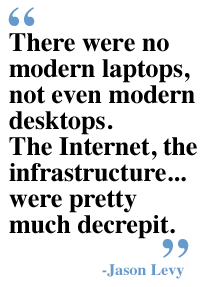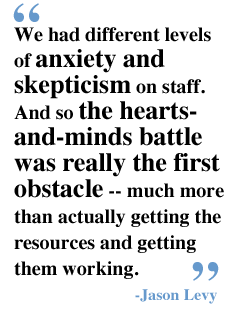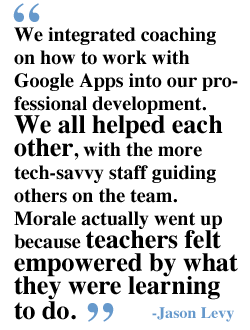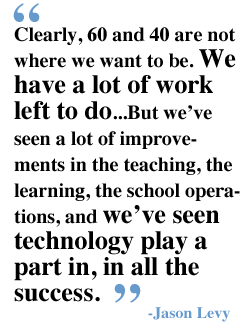|
VIDEO
| ||||||||||||||||
How Google Saved A SchoolTwo years ago, this middle school was at risk of being shut down by the city. Today it's a success story. What happened? | |||
Schools need to catch up with all the information kids are receiving from everywhere else.... 4:32 |
As we hurtle along with technology, it's important that someone reminds us what's being le... 4:53 |
Cell phones offer a new way to expand learning beyond the regular school day, says Secreta... :43 |
MORE RELATED STORIES |
posted February 2, 2010




 Nakia talks about her "real world self" vs. her "online self."
Nakia talks about her "real world self" vs. her "online self." Delvin talks about revealing his emotional side online.
Delvin talks about revealing his emotional side online. Jesus uses the tools of the Internet for social activism, to make the world a better place.
Jesus uses the tools of the Internet for social activism, to make the world a better place.
Comments
This is fantastic!
Jason Wallis / August 27, 2009 10:18 PMThis is a great testimony to what modern technology can do in the educational environment. Every teacher and administrator in the country needs to see this.
However, the title of the story is how Google saved this school. Yet they never mention Google and barely show the use of Google Docs. I agree Google is providing amazing and free tools for education. But Apple products and software is all over the story. Remote Desktop and Photo Booth. iBooks, MacBooks, and iMacs everywhere. Maybe this story should of been titled How Apple Technology transformed this school.
Chris Peters / August 28, 2009 11:30 AMI agree Chris. Great observation. A little shout out to Apple would have been appropriate, but edtech folks notice these things regardless.
Jim Harmon / August 31, 2009 7:02 PMThis article does not show how test scores were improved. The majority of the article shows that all the kids got laptops and goofed off with them. An extra administrative position had to be added in order to police the computer use. Please explain how Google docs was used as an educational instrument.
Justin Brooksby / August 31, 2009 9:54 PMnice video. the computer and the internet is very useful. I love this video. its well done. I agree to block youtube and myspace at school because information does not hurt people. its people that hurt people with cyberbullying or a predator ect. so great video. I am an internet safety advocate/instructor for special needs people. and I agree with this video. well done Guys.
KRYSTIAN / September 2, 2009 5:02 PMHi Krystian, if you block youtube, you also block a lot of art-, science- and education-videos. Pupils have to learn, that they can use youtube for much more than entertainment. Also you block the possibility that pupil post their own creative shortfilms, music-clips and more.
joerg / September 10, 2009 10:19 AMoh OK. but in my schools when I used to be in schools, I was not allowed on Myspace or youtube. ok I should tell my city's school board with a news letter then. I agree. thanks for your help. I didn't think about it this way before.
KRYSTIAN / September 18, 2009 11:13 PMI agree, Teachers and school admins and the school boards and everyone should see this video, because the internet is very useful and it has its benefits and things, so they should allow people on Youtube or Myspace ect. I agree. the internet has risks yes but it can also be useful, its not that dangerous. schools should have a cyberbullying policy in schools. well done Guys.
KRYSTIAN / September 18, 2009 11:21 PMThe schools should teach students how to use their cell phones and how to be safe using them and how to use them. and how to use social networks regardless of what type of social network, is on how to use it safely and it has educational benefits too. that was not good, that teachers and school admins and the school board blocked Myspace ect. they should have to learn how to use it and teach them to be accountable when they use their cell phones ect. and this will be good for internet safety education. even the school library blocked Myspace and certain sites. that's not good. its OK to go on Myspace ect, but you need to know how to use it first in a safe way. and keep your self safe.
KRYSTIAN / September 18, 2009 11:29 PMThis video was an "ata boy" for educators who have lowered their standards across the board. It's a shame.... Was the problem of why were students disengaged to begin with addressed? The allure of the shiney macs & babysitter software will soon be gone, too, and the disenchantment will again set in. Was the new pedagogy (not the tools!) of collaboration celebrated? THAT would be my idea of "how Google Saved a School" yet it was barely touched upon. Instead, we saw kids behaving as kids, administrators behaving as really poor babysitters (Please tell me how the administrator using his "virtual front" is forming a relationship with these kids who are obviously in an environment where that is so important!), and teachers who we THINK are taking great strides in updating their pedagogy & curriculum.... but we can't be convinced by this video testament.
I pity the administrator who spends his/her day trolling for "violators" -- it was pretty creepy not to mention unethical, by the way, that he spied and then "fooled" them with the countdown. How is that person improving themselves or their school? As a student, I would see a challenge in the spy-ware -- hack the system, tell your friends! Get some tape to put over the camera; claim your AP was looking at you without consent -- demand it be stopped as it is a violation of your right to privacy! etc., etc., etc.
One last thing -- saying it's important kids are "using tools they're going to have to use in 5 years anyway" is an amazingly short-sited statement. Are the tools she referred to "knowledge skills", "people skills", hardware, software, or ???? This video leads me to believe she was talking about hardware & software skills.... How many blogs or iphones were there 5 years ago?
I really hope there aren't too many folks looking to this video for an answer... It should have shown so much more. The school's success certainly can't be attributed to the police-state and the new platform replacing text books. The implementation of what's highlighted here is NOT the key to a success story. The success is in the collaboration of students, teachers, and administrators working toward a common goal. If they keep dividing that collaboration with the interruption of "nanny cam", etc., then the fissure will have adverse effects, guaranteed.
CMG / October 29, 2009 2:52 PMAwesome. More schools need to embrace this idea. Those who oppose it are obviously not from the "digital age," and should rightly recognize that. Now that I think back, literally the first computer program that I remember was Math Blasters in 3rd grade (multiplication intensive), each student was required to play 30 min or so a week (there was only one computer in the classroom). I've been a math whiz ever sense. I'm not arguing that the computer game did it (because I don't know how I would have excelled without the game), but still to this day I am better with multiplication than with addition (which was learned in I guess first or second grade, no recollection really). It's interesting I think.
JH / November 7, 2009 5:33 AMGiving kids up to date technology is not the smartest idea, I think the school administration needs to come with plan, in which they could assign students computer work in a given amount of time. Otherwise having a laptop could be distraction for anyone
bilal / December 2, 2009 7:09 PMThis is powerful. Jason Levy had the vision to see that students, given the technology and, very importantly, the chance to use it in a relaxed environment that still has high expectations, will succeed. This is an object lesson for schools all over the U.S. as well as places like Great Britain where I live.
malcolm bellamy / January 7, 2010 10:50 AMWell done PBS for this. I haven't been as moved by an educational video for a long time!
Looks to me more like APPLE saved the school. The Laptop for every child is something they don't have access to at home, because of poverty. This means that school has become a privilege, for these kids, not just incarceration.
The computer gives the teacher and the administrator great power to spy and control the student's. The carrot of freedom and independence, with the stick of big brother. A currency of access.
The use of the computer requires the ability to read and write, but the computer does the math, so there seems little incentive to learn it. Yet the show listed 62% at or above grade level, now that computers are available. What are the math scores of these students?
What is the cost to the school for new computers each year or two, and the training of educators?
What happens when the tables are reversed by a smart student, who uses the technology to spy on his teachers and change grades, or just plagiarize and cheat? The lesson becomes cheating is fun, and profitable. When caught, the lesson is don't get caught.
Michael Russell / January 19, 2010 7:53 AM